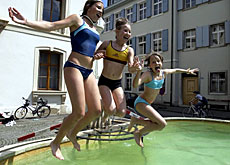Killer heatwave prompts calls for action

Health experts are calling on the authorities to draw up a national action plan to prevent a rise in mortality rates during heatwaves.
Figures released this week revealed that the number of deaths rose sharply in Switzerland last summer.
Last year’s heatwave caused an estimated 25,000 more deaths than average in Europe, of which almost 15,000 were in neighbouring France.
Switzerland did not escape the effects of the heat, with the number of deaths peaking at more than 200 a day.
According to the Federal Statistics Office, the mortality rate increased by 9.5 per cent in August compared with the same period in 1999-2002.
Between August 9 and 14, there were between 200 and 220 deaths per day, compared with an average of 140-150 for previous years.
Stéphane Cotter, head of demography and migration at the Federal Statistics Office, says the numbers should be treated with some caution, as the causes of death are not included in the statistics.
“We noticed that the rise was mostly during the very hot days of August… so we can say there is probably a relation between the rise in the number of deaths and the heatwave. But it’s not such a dramatic rise as in France,” he added.
Statistics for some cities and cantons are more alarming. According to newspaper reports, the mortality rate rose by 27.2 per cent in canton Geneva, 32.1 per cent in the city of Geneva and 29.7 per cent in Basel.
Not surprised
Charles-Henri Rapin, professor of geriatric medicine at Geneva University Hospital, says he is not surprised by the results, as hospital figures also show a rise in the number of deaths last summer.
This week Rapin organised a meeting of health and care experts, as well as groups representing old people, to discuss the effects of heatwaves.
An awareness day highlighting the risks of dehydration will take place on June 21 across the French-speaking part of the county.
Rapin said that it was important for the authorities to respond to the problem.
“We have an ageing population: 15 per cent of people are now aged 65 and over and this will double over the next 20 years,” he told swissinfo.
“So we have to prepare for this situation; we can’t let people die just like that.”
Raising awareness
He believes the first step would be to raise awareness and then to propose simple measures that could be carried out by health care professionals either on home visits or in medical centres.
He would also like to see the government draw up a national strategy and each canton set up its own action plan.
This would include emergency procedures for when temperatures get dangerously high and a special monitoring centre which would collect more complete data.
He said the effects of the heat were mostly felt by old people, although others such as small children and the disabled are also at risk of becoming fatally dehydrated during hot temperatures.
Old people are more likely to be affected because age makes them less thirsty and they retain less salt – which helps the body stay hydrated – than younger people. They are also more likely to be taking prescription drugs, which is also a contributing factor.
“There are also social reasons, such as the isolation of old people. Old people, especially in cities, live on their own and this can be dangerous during a heatwave,” said the professor.
swissinfo, Isobel Leybold
Signs of dehydration: lack of appetite, dryness in the mouth, lower frequency or absence of the need to urinate, tiredness, headaches, confusion, dizziness or falling.
Appropriate action: lots to drink, preferably cold drinks such a fruit juice, water and lemon, seasoned tomato juice, as well as broth to replace the salt.
Other measures: air rooms, keep out of the sun, wear light and airy clothes and talk to your doctor.

In compliance with the JTI standards
More: SWI swissinfo.ch certified by the Journalism Trust Initiative











You can find an overview of ongoing debates with our journalists here . Please join us!
If you want to start a conversation about a topic raised in this article or want to report factual errors, email us at english@swissinfo.ch.